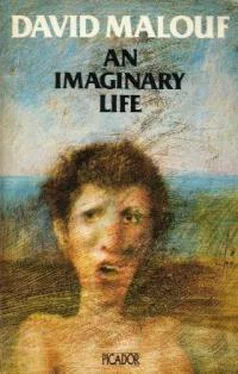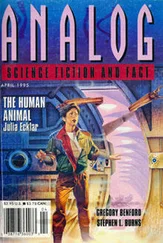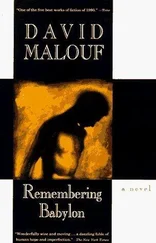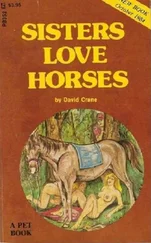As the pinewood begins to thin, what lies beyond comes into view. At first I cannot guess what it is. Then I realize from the tales I have heard that it is a great circle of funerary mounds, a hundred of them perhaps, all made of broken stone and many of them still surmounted by the skeleton of a horse and rider, impaled on a pole, which is the proper burial for a horseman. I follow the riders around the great circle. Big birds go flapping away and climb in a circle above us. The wind shakes the poles, which clatter in their sockets, and I am reminded, by this ghostly army, of my dream. We ride around the circle, once, twice, a third time, then come to a halt. The headman takes from his shoulder a wallet full of grain, and suddenly leads the whole party off on a wild race amongst the dead, back and forth between the rattling poles and their skeletons, casting handfuls of grain to the dead mouths and shouting to scare away evil spirits and birds. I observe for the first time that there are stunted stalks of barley, wild oats, wheat even, all around me in the sunlight. We are in the middle of an immense field. The men’s yelling dies away and the old man rides up beside me, smiling, and offers me a handful of seed. I take it sheepishly, but fail at first to catch his intention. With a grin that shows all his bad teeth, he throws his head back and lets forth a bloodcurdling cry. Then nods and looks expectant. Self-consciously, I repeat the sound. He smiles again, and still smiling, claps me on the shoulder. I ride off into the glittering circle, offering my feeble parody of a horsman,s death cry and scattering my handful of grain.
Oddly enough as I weave back and forth between the towering forms I feel a moment of exhilaration, and am reminded of something - something that my mind just fails to grasp, as if all this had happened before. I shout again, louder, and make a narrow circuit of the field, as I have seen the others do, letting the cold air fill my lungs, then expelling it in a long cry, and feel freed of something. It is as if some fear went out on my breath and left my spirit clear. I am Roman, I tell myself, trotting back to where the others sit, grinning broadly, I am a Roman and a poet. But that breath and the sound it carries still moves out from my body into the world, and I feel freer for it. The old man greets me with a handclasp. He says words that I do not understand, and as we ride off one of the young men holds his horse aside, so that I go down the steep defile immediately behind the headman, with the rest of the party behind.
Riding out into the sunlight I find myself thinking, for perhaps the first time in thirty years, of the brother who died when I was a young man, and who place I took as my father’s heir.
Thirty years ago. Riding just like this after his funeral, with my father at my side, I suddenly urge ahead and put a horse’s length between us. He is angry with me, and I feel hurt, slighted, because I know what he is thinking: that of the two of us it is my brother who should have survived. I am the frivolous one, who will achieve nothing in the world. It is my brother who would have saved the last of our lands, won important public office, done all a good son can be expected to do in the way of piety towards his family gods. I know this is true and feel my life, my whole body’s weight in the saddle, as a burden. I would do anything to be lying in the stone tomb, and to have him riding away in the sunlight with my father at his side. But pride has made me stubborn. And guilt. I have just told my father, as we move into single file, that I am leaving and will not return. I have already begun to leave - starting away from him on the narrow path from the grove and keeping the whole horse’s length between us. I am already on my way to Rome. I am already, though I cannot know it yet, on my way to exile, setting out for this day, thirty years later, when I will be an old man riding with barbarians at the edge of the world, outside the Roman law my father believed in so passionately, and the Roman State to which he dedicated our lives, with not a man now in nine days' riding distance who knows the Roman tongue. Who could have guessed, that morning, that we should ride so far from one another - that his curse upon me, unspoken perhaps, not even allowed to break the surface of his mind, should have carried me so far, and should have been, all these years like a cold draught upon my back, even in sunlight. Now, suddenly, the sunlight upon my back is warm. Somewhere, in all that barbaric shouting up there on the plateau, I had let them back into my life, the brother thirty years dead, the father buried only a year before my disgrace. It was for them that I was shouting. Rites that I had merely gone through the motions of at my father’s funeral - a Roman son sacrificing, sprinkling a few cold drops for a Roman father - suddenly came alive in that shout and I was finished with the dead. Free, at last, to prepare a death of my own.
We enter the birch woods of the hunting place towards midday. The trees are already bare for the most part, their silvery trunks slashed with black, the last golden leaves caught in a broomstick of twigs, and the earth under our hooves sighing and sifting with the drifts of those that have already been shaken down. The sun is watery, the sky pale, the day windless. Almost unnaturally still.
One of the young men dismounts and leads his horse, stooping to examine the earth, where it is visible, for tracks. We all climb down and walk behind him, and he leads us to a wolf’s den. The bitch stands at the entrance with her fangs bared, and her cubs, caught in the open, stop tumbling about on the earth, nipping at one another, little soft things, all fur, and as we come up start back and stand on all fours behind her, staring. We pass by, and later, find the tracks of a bear, and then deer tracks. And among them, astonishingly, though the others seem unsurprised, the prints of a human foot, bare, small, the prints perhaps of a child. The old man nods gravely and explains with signs. It is a child, a boy of ten or so, a wild boy, who lives with the deer. They found the prints first two seasons ago. And last year one of the hunters saw the boy but could not get close. I am in a ferment. I have a thousand questions to ask them but can say nothing. Where does the boy come from? Who were his parents? How did he get here? How can he have survived, naked in all seasons, and with no one to feed or nurse him? Of course I have heard of such occurences before. There are stories of wild children all over, but nobody, when you pin them down, has actually seen on. Then there are our Roman twins, the wolf brothers, the fathers of our state. Does anyone believe, I wonder, the actual facts of their legend - anyone, I mean, except a few simple peasants? But the child’s prints are real. As real as the deer tracks beside them.
I touch one with my fingertips, and try to conceive from that contact, the creature that has made the print. Beginning with some warmth I imagine I can feel, I conjure him up, I call him to mind. But this is absurd. The foot must have touched the ground for the merest flash of a second. The child was running, springing along over the leaves. You can tell by the depth of the impression, and how wide apart they are, these prints, that the child runs with the deer and can equal them in swiftness. I touch one of them again. They seem miraculous. And suddenly, as if my imagination had indeed summoned him up, I see the child, and stranger still, recognize him. I, first of all of us, see him outlined against the blue light between two birches about fifty yards off, crouched like an animal, starting at us, a small boy as lean as a stick, with all the ribs of his torso showing under the tanned skin, bony elbows and knees, and straight black hair to the shoulders. He springs up at my cry and goes bounding away into the woods.
Читать дальше












